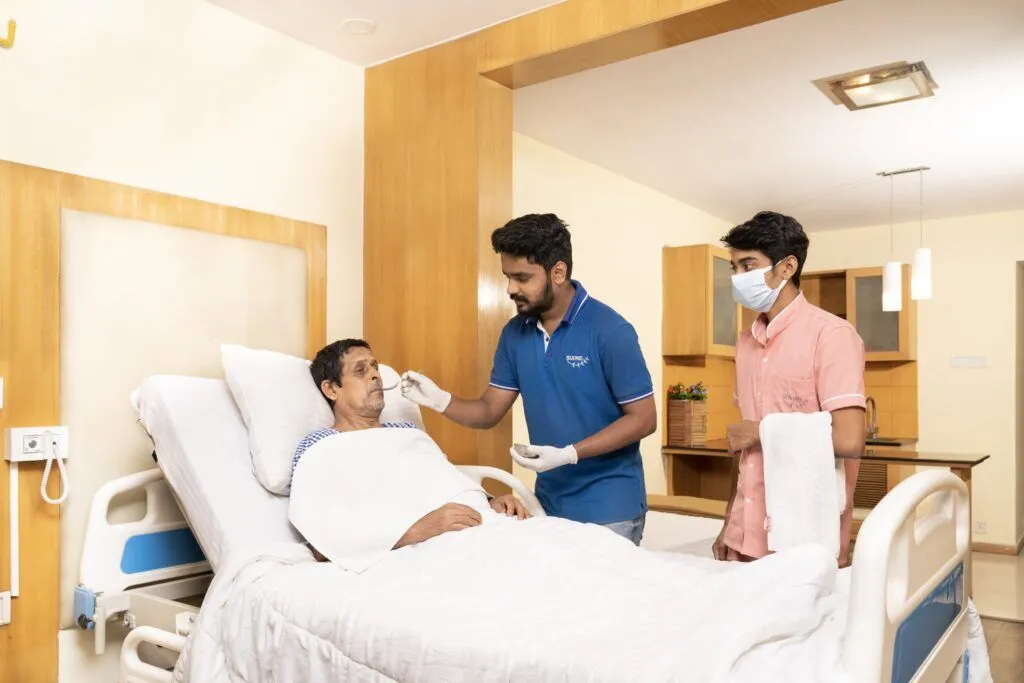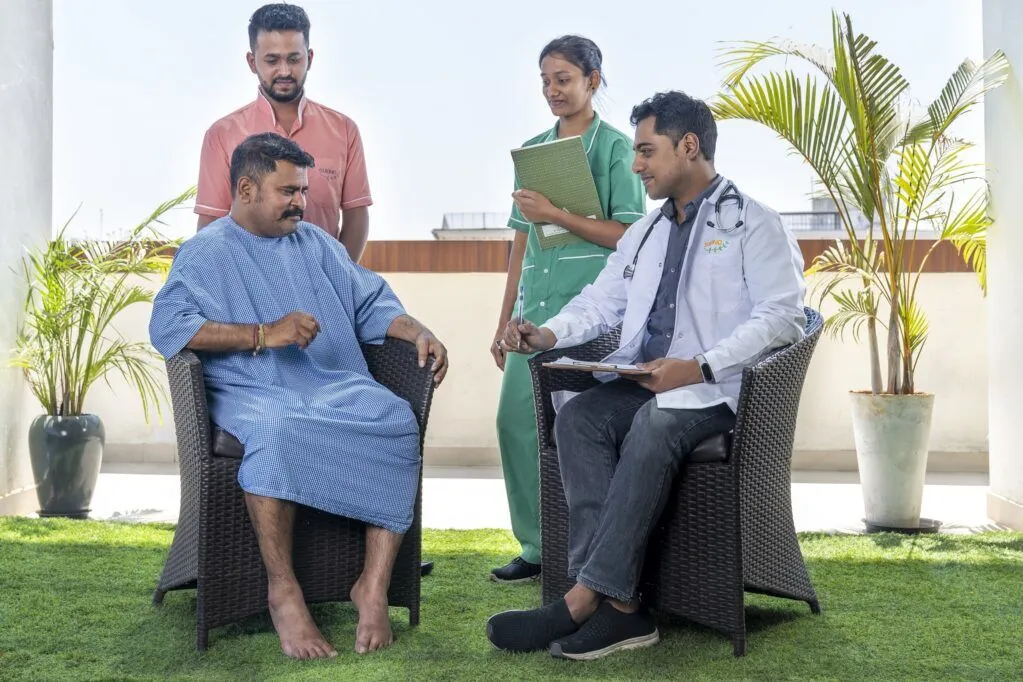
Nirvaana Bipolar Disorder Rehabilitation Facility in Bangalore provides comprehensive rehabilitation services for those living with bipolar disorder. We utilize evidence-based treatments tailored specifically for each individual, to foster recovery and stability for each of our clients. With compassion in mind, we guide individuals towards mental wellness while equipping them with tools for long-term success.
Understanding Bipolar Disorder
Bipolar disorder (BPD) is a mental health disorder with an episodic course characterized by episodes of Mania (periods of significantly elevated mood and energy levels) and Depression (persistent low mood, fatigue,lack of self esteem). Bipolar disorders is major cause of longterm impairment of daily functioning, relationships, and quality of life; rehabilitation plays an integral part in treating its symptoms while providing individuals with support to live fulfilling lives.
Signs and Symptoms of Bipolar Disorders
Recognizing the signs and symptoms of bipolar disorder are crucial for early diagnosis and treatment. Some key symptoms of this illness include episodes of manic and depression with intervening periods of relative normalcy.
Manic episodes:
- Increased energy levels and elevated mood
Individuals can experience an elevated or expansive mood, not in keeping with the situation or environment. This mood can quickly turn into irritation. They also experience a surge of energy and try to do many things at once.
- Cognitive and Behavioral Changes
- Racing thoughts: reflected as rushed speech and difficulty concentrating at one thing at a time.
- Elevated self esteem: or grandiosity. The individual thinks very highly of himself either in terms of their ability or identity. They could also believe that they’ve been sent to earth for a special purpose. Family members report these beliefs to be completely false.
- New plans and initiatives: they very commonly make new and expansive plans, start buisnesses, take on new roles etc.
- Increased talkativeness: they may talk more and faster and it is difficult to interrupt them.
- Impaired Judgment
– Making Risky Decisions : Taking part in dangerous activities, or making bad financial decisions, sexual indiscretion etc
- Substance Abuse: Increasing likelihood of alcohol and drug abuse.
Depressive Episodes:
- Persistent Sadness: Feelings of sadness that do not go away quickly are known as persistent sadness.
- Decrease in Interest/Joy: An obvious decrease in enjoyment from once-revered activities such as sexual encounters, hobbies and social interactions.
- Fatigue: Prolonged tiredness and energy deficit even with adequate rest.
- Changes in Sleep Patterns: Either insomnia (difficulty sleeping) or hypersomnia (excessive sleeping).
- Alterations to Appetite: Changes in eating habits may lead to significant weight loss or gain, leading to significant weight fluctuations and dramatic fluctuations in appetite.
- Feelings of Guilt or Worthlessness: Overwhelming feelings of guilt or low self-esteem can have serious repercussions, both within oneself and others.
- Difficulty Concentrating: Are You Struggling with Concentration, Making Decisions or Remembering Things?
- Suicidal Thoughts: Upon reaching a critical state, thoughts of death or suicide may surface.
Early identification of these symptoms allows for timely intervention, helping individuals reclaim control over their mental wellbeing. A patient could remain well for many months after an episode, before the next episode occurs.
Bipolar Treatment Options and Therapies

Medication Management: Our physicians may prescribe mood stabilizers, antipsychotics or antidepressants in order to effectively manage symptoms. Medications are required both in the acute treatment phase (to bring symptoms under control) and in the maintenance phase (to prevent relapses)
Cognitive Behavioral Therapy (CBT): Focuses on altering negative thought patterns and behaviors to control mood swings.
Family Therapy: Includes providing education to families about bipolar disorder while improving communication and support within the family unit.
Psychoeducation: Provides individuals and families with information on bipolar disorder, helping them understand its symptoms, triggers, and treatment options.
Lifestyle Adjustments: Our guidance includes advice for maintaining a healthy lifestyle through regular exercise, stress management techniques and eating a well-balanced diet which are vital components of long-term well-being.
Why Rehabilitation
Bipolar disorder tends to have a long course with multiple relapses. This has a serious impact on a person’s development- including personal, professional and social. Most treatment strategies concentrate on symptom management, there is often a gap in addressing the broader psychosocial needs of the individual. The family is usually left uncertain of how to manage the residual functional and social challenges. Rehabilitation services provide tailored support to foster independence and more sustained recovery.
Bipolar disorder has a significant impact on a persons personal, professional and social life. Patients suffering from Bipolar disorder often need continued support after initial control of symptoms. Rehabilitation centers for bipolar disorder provide structured environments in which individuals can focus on recovery. Benefits of choosing such centers for bipolar disorder may include:
Stabilization of Mood Swings: Therapeutic interventions provide support in terms of preventing relapses of manic or depressive episodes
Holistic Care: Patients receive medical, psychological and social support to provide comprehensive care.
Enhance Quality of Life: Through structured therapy, individuals can regain independence and enhance overall well-being.
Long-Term Recovery Plans: Rehabilitation centers equip their patients with tools such as coping mechanisms and lifestyle strategies designed to prevent relapse and maintain stability in order to increase quality of life and prevent future recurrences.
Support with restarting education or work: Due to the onset of these disorders in the early life, many individuals drop out of colleges or quit work. It is essential to provide supports required to restart this journey
Addressing family concerns and burden: family members play a crucial role during the treatment and maintenance phases. They are the major supports for the patient but also require some support for their own concerns and needs.
About Nirvaana
At Nirvaana Mental Wellness, we treat a wide range of psychiatric and mood disorders, providing comprehensive care through a combination of various therapies that make the individuals come back to their routine lives.

Commitment to Excellence
We provide evidence-based treatment using cutting-edge therapies and proven research methods, combined with compassionate care from our dedicated team, ensuring a smooth and successful recovery from anxiety.

Holistic Approach
At our facility, we employ both traditional treatments and holistic practices in order to address all aspects of mental health – physical, emotional, and social wellbeing are taken into consideration when providing holistic treatments.

Expert Care Plan
Care plan crafted by experienced team of multidisciplinary team of psychiatrists, therapists and counselors specialize in bipolar disorder treatment, with years of experience helping our patients recover.

Well-equipped Facility
we understand the vital role environment plays in recovery. We offer modern, comfortable accommodations and amenities designed to provide holistic support through therapeutic options and lifestyle changes
